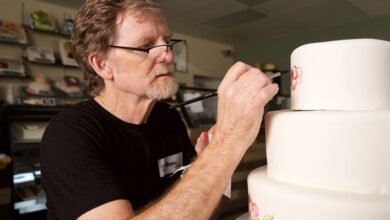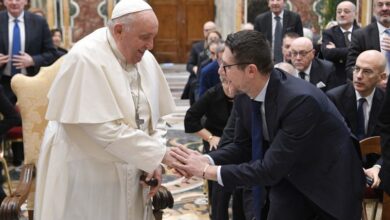What Pope Francis had to say about the Synod on Synodality in the in-flight press conference
 Pope Francis responds to questions from the press aboard the return flight to Rome from Mongolia. / Vatican Media
Pope Francis responds to questions from the press aboard the return flight to Rome from Mongolia. / Vatican Media Aboard the papal plane, Sep 4, 2023 / 09:07 am (CNA).
In his in-flight press conference returning from Mongolia on Monday, Pope Francis outlined his vision for the upcoming synodal assembly in October, which he said should be a prayerful exercise in dialogue free from ideology, not full of “political chatter” like a television talk show.
Pope Francis was peppered with multiple questions about the Synod on Synodality from journalists traveling with him on the 10-hour flight from Ulaanbaatar to Rome on Sept. 4.
“In the synod, there is no place for ideology,” Pope Francis told journalists on the chartered ITA Airways plane.
“There is no place for ideology, but there is room for dialogue, for an exchange between brothers and sisters,” he added.
Pope Francis emphasized the unique spiritual dimension of the first global Synod on Synodality assembly taking place at the Vatican Oct. 4–28. He said that he wants it to be “a religious moment.”
He highlighted how the synodal assembly should have three to four minutes of silent prayer between discussions, noting that this prayerful atmosphere should be what distinguishes a synodal assembly from “parliamentarianism.”
“Without this spirit of prayer, there is no synodality,” the pope said.
“There is one thing that we have to keep — ‘the synodal atmosphere,’” Francis added.
The synod should not be like a television talk show where everything is discussed, the pope explained, but a “dialogue between the baptized.”
“The synod is the dialogue between the baptized, who in the name of the Church, [discuss] the life of the Church, [and] dialogue with the world on the problems that affect humanity today,” he said.
Pope Francis pointed to the tradition of synods in Eastern Churches as an example.
“The Eastern Church knows how to live out synodality. It is living it as Christians … without falling into ideologies,” he said.
Pope Francis was asked about a recently published book with a preface by U.S. Cardinal Raymond Burke that compared the Synod on Synodality to opening “Pandora’s box.”
In response, Francis recalled how some religious sisters had also expressed to him their fears about the synod, telling him that they feared changes to Church doctrine.
Pope Francis said that at the root of these types of ideas about synodality, one always finds “ideologies,” adding that it is ideologies that are responsible for dividing the faithful.
He explained that “a ‘doctrine’ in quotation marks” is a doctrine that is like “distilled water,” without any taste and is not true Catholic doctrine.
“Many times true Catholic doctrine scandalizes — how scandalous is the idea that God became flesh, that God became man, that Our Lady preserved her virginity. This scandalizes,” the pope said.
“Catholic doctrine sometimes scandalizes. Ideologies are all ‘distilled’ and never scandalize.”
How the October synodal assembly will work
When asked why synod discussions will be taking place behind closed doors without access for journalists and how the synod can maintain transparency with this format, Pope Francis responded that the synod will be “very open.”
Pope Francis explained that there is a Commission for Information under the leadership of layman Paolo Ruffini, the prefect of the Vatican Dicastery for Communications, that “will make press releases on how the proceedings of the synod are going” and “provide information on the progress of the synod.”
“In the synod, the religiosity and the loyalty of the people who speak must be guarded, and this is why there is the commission led by Ruffini,” he said.
“The commission does not have an easy task,” he added, noting that the synod’s commission will need to be respectful of each delegate’s interventions and provide updates on the synod proceedings that are “constructive for the Church,” and “not gossip.”
The pope told journalists that the news about the synod should not read like “political chatter,” adding that the information commission is tasked with transmitting “the Christian spirit, not the political spirit.”
“Do not forget that the protagonist of the synod is the Holy Spirit,” Pope Francis underlined.
The Commission for Information is not a novelty to the Synod on Synodality, but has been a regular feature of Synod of Bishops assemblies in past years.
What is unique about the upcoming synod is that for the first time, the assembly will include voting delegates who are not bishops, including laypeople, priests, consecrated women, and deacons selected by the leadership of this year’s continental synod meetings or, in some cases, directly by the pope.
The Synod on Synodality, initiated by Pope Francis in October 2021, has been a multiyear, worldwide undertaking during which Catholics were asked to submit feedback to their local dioceses on the question, “What steps does the Spirit invite us to take in order to grow in our ‘journeying together?’”
The Catholic Church’s massive synodal process has already undergone diocesan, national, and continental stages. It will culminate in two global assemblies at the Vatican.
The Instrumentum Laboris, or working document, guiding the assembly discussions suggests discernment of questions regarding some hot-button topics, including women deacons, priestly celibacy, and LGBTQ outreach.
The first October assembly will be held in the Paul VI Hall, instead of the Vatican’s New Synod Hall, with delegates sitting at round tables of about 10 people each to discuss how to advise the pope on the topic: “For a Synodal Church: Communion, Participation, Mission.” The second assembly is set for October 2024.
Pope Francis has a busy month ahead leading up to the first October synod assembly. The 86-year-old has another international trip planned not long after returning from his four-day trip in Mongolia.
The pope will travel to Marseilles, France, publish an update to Laudato Si’, preside over an ecumenical prayer vigil, and create 21 new cardinals at a consistory at the end of the month.
During the 40-minute in-flight press conference, Pope Francis spoke about Vatican-China relations, the possibility of a papal trip to Vietnam, and further clarified his recent comments on Russian imperialism.



